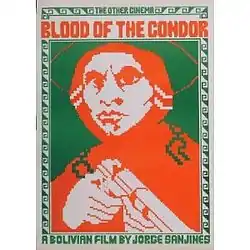Blood of the Condor
Blood of the Condor (Quechua: Yawar Mallku, Spanish: Sangre de cóndor) is a 1969 Bolivian drama film co-written and directed by Jorge Sanjinés and starring Marcelino Yanahuaya. The film tells the story of an indigenous Bolivian community receiving medical care from the Peace Corps-like American agency Cuerpo del Progreso ("Progress Corps") which is secretly sterilising local women. The story, which was based on accounts by the indigenous people to the filmmaker, provoked an outrage in the public which led to a government investigation about the Peace Corps' actions in Bolivia, which ended in the expulsion of the agency from the country.
| Blood of the Condor Yawar Mallku | |
|---|---|
 Theatrical release poster | |
| Directed by | Jorge Sanjinés |
| Produced by | Ricardo Rada |
| Written by | Jorge Sanjinés |
| Starring | Marcelino Yanahuaya |
| Music by | Alfredo Domínguez Ignacio Quispe Alberto Villalpando |
| Cinematography | Antonio Eguino |
| Edited by | Jorge Sanjinés |
Production company | Ukamau Group |
| Distributed by | Tricontinental Film Center (1973, US) |
Release date | 1969 |
Running time | 70 minutes |
| Country | Bolivia |
| Language | Quechua Spanish English |
Plot summary
An indigenous Bolivian community receiving medical care from the Peace Corps-like American agency Cuerpo del Progreso ("Progress Corps") which is secretly sterilising local women. The Bolivians attack the foreigners, and the attackers are rounded up and shot by the authorities. The brother of the shot protagonist desperately seeks medical care for his brother, but due to lack of money for proper care his brother dies.[1]
Impact
Sanjinés' Yawar Mallku is thought to have led to the expulsion of the Peace Corps from Bolivia in an act of anti-imperialist cultural nationalism by the indigenous people.[2]
After showings of Yawar Mallku, Sanjinés learned that many peasants had criticism about the difficulty of his films due to the use of flashback for narration, as his film-making was greatly influenced by European art cinema, and about the lack of attention to denouncing the causes of the indigenous peoples' issues. He took this into account when making his next film, called El coraje del pueblo ("The Courage of the People"), in 1971.[3]
Further reading
- Revolutionary Cinema: The Bolivian Experience, Jorge Sanjinés. In: Julianna Burton (editor). Cinema and Social Change in Latin America: Conversations with Filmmakers. University of Texas Press, 1986. ISBN 0292724543, 9780292724549
References
- Stephen M. Hart (2004). A Companion to Latin American Film. Boydell & Brewer Ltd. pp. 69–. ISBN 978-1-85566-106-6. Retrieved 11 August 2012.
- Geidel, Molly. "Sowing Death in Our Women's Wombs": Modernization and Indigenous Nationalism in the 1960s Peace Corps and Jorge Sanjinés' Yawar Mallku. American Quarterly - Volume 62, Number 3, September 2010, pp. 763-786
- Rosalind Galt, Karl Schoonover. Global Art Cinema: New Theories and Histories. 2010, pp. 359.